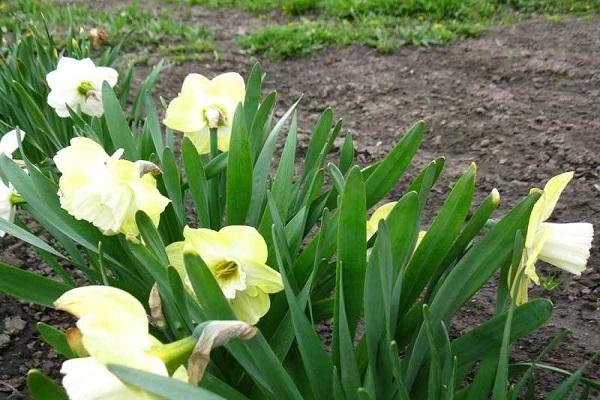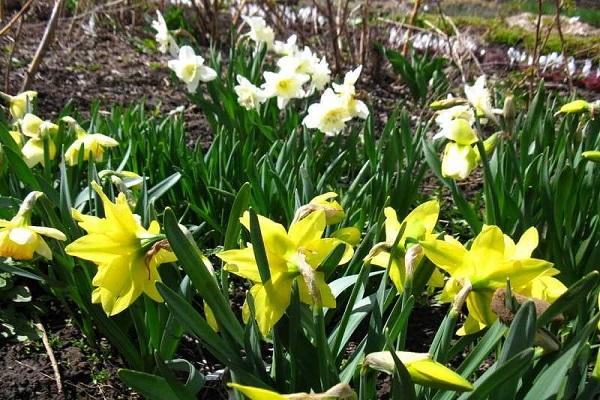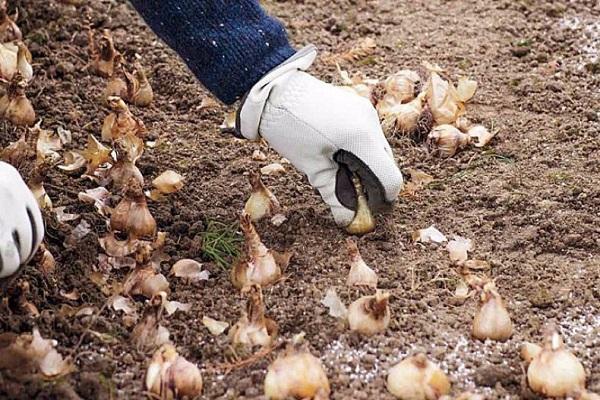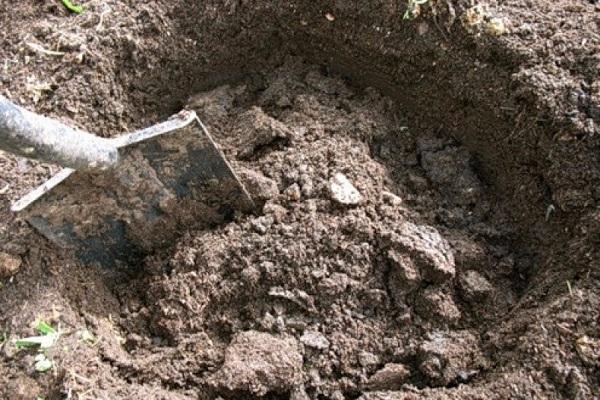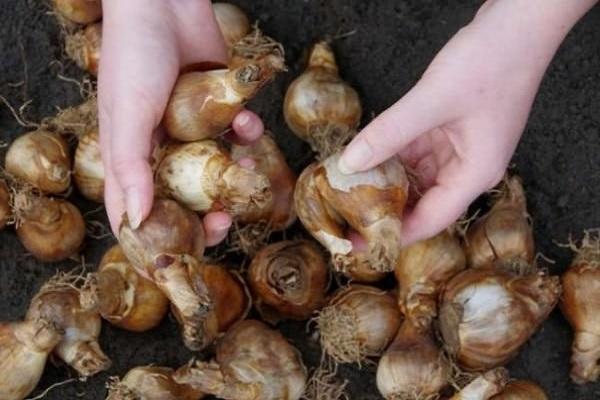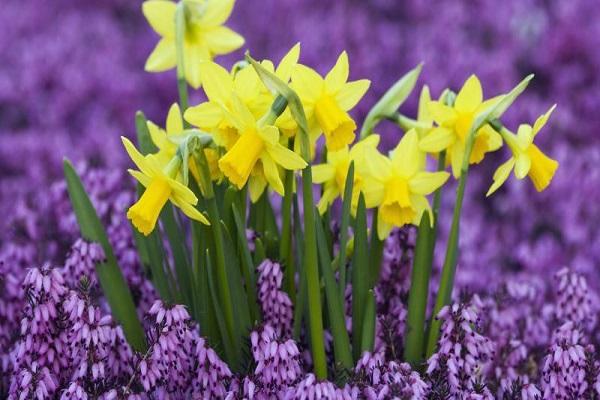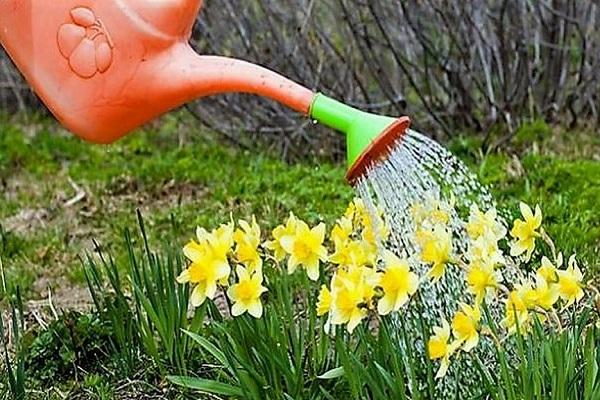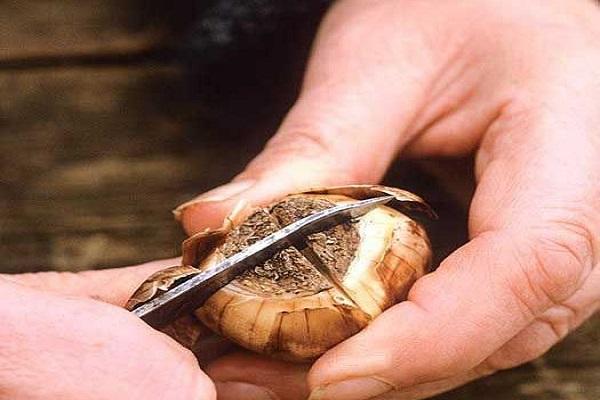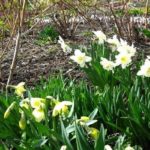The terry daffodil of the Sweet Pomponet variety became known to gardeners only a few years ago, but has already managed to win great love and popularity with its unearthly beauty and decorative qualities. The remaining varieties of daffodils were created by selection and are cultivated by gardeners and flower growers all over the world. Terry varieties of this garden crop are especially valued, blooming in large, multi-level inflorescences.
- Description and characteristics of the variety
- History of sweet pomponette selection
- Growing
- Landing dates
- Soil preparation
- Selection and storage of planting material
- Planting scheme
- Rules of care
- Loosening and weeding
- Watering
- Protection from pests and diseases
- Top dressing
- Reproduction
- Application in landscape design
- Reviews
The onset of real spring is always accompanied by the rapid flowering of delicate and fragrant daffodils. After all, these flowers are among the first to announce the end of the cold weather.
In their natural environment, daffodils grow in the foothills of Mediterranean countries, Europe, Asia and the Caucasus. Large colonies of flowers are found in the Carpathians and the Alps.
Description and characteristics of the variety
Sweet Pomponet is a bulbous spring flower with excellent decorative qualities. The height of the plant depends on the region of growth, from 25 to 50 cm. The stem is thin, the leaf blades are narrow, long, pointed towards the end, of bright green shades. Large inflorescences appear on a high peduncle and bloom with multi-layered, double flowers of a golden hue in the shape of a ball, with a delicate, light aroma. The diameter of the flowers is from 12 to 14 cm. The active flowering phase occurs in the middle or end of April.
The plant is grown in one place for 3 to 5 years without replanting.
There are several varieties of the Sweet Pomponet variety.
- Sweet Ocean, narcissus with large, double flowers. The core of the inflorescence is bright orange, turning into snow-white, shining petals.
- The Sweet Pomponette variety of narcissus was also bred in the Netherlands. Large spherical flowers with a bright yellow core and snow-white petals around the edge.
Important! The garden crop tolerates winter frosts down to -25-27 degrees and does not die during prolonged drought..
Daffodils of the Sweet Pomponet variety are recommended for growing in any climatic zone.
History of sweet pomponette selection
Dutch breeders have given the world a large number of beautiful hybrid flowers and plants. In 2013, another masterpiece of Dutch selection, the Sweet Pomponet variety, was bred.To date, the originator of the new garden crop is not known; most likely, it is a big secret.
Growing
Growing beautiful spring primroses in your garden is not difficult. Even a novice gardener can cope with this task. The main thing is to accurately determine the place and timing of planting flower bulbs.
Plants love well-lit places, protected from strong winds and drafts.
Landing dates
Daffodils are planted in open ground in autumn or spring.
- Spring planting occurs in April. Recommended only in temperate and southern climates. In the northern regions, flower bulbs will not have time to develop, so the daffodils will grow small and weak, and the garden crop will bloom sparingly.
- When planting flowers in autumn, the bulbs have time to take root firmly in the soil. Daffodils are planted 1.5-2 months before the first frost.
Important! When planting daffodils, crop rotation is observed. It is not recommended to plant garden flowers in flower beds where bulbous or nightshade crops grew..
Soil preparation
Daffodils are not picky about the composition of the soil, but preference is given to loose, well-moistened soils with a low acid content.
Before autumn planting, the soil for flowers is prepared in the spring.
- In the spring, lime, peat, sand and humus are added to the soil where flowers are planned to be planted.
- In the summer, the flowerbed is carefully dug up and the soil is mixed with mineral fertilizers.
- In the fall, before planting the bulbs in open ground, the flowerbed is loosened.
Garden crops will not grow or bloom in swampy and damp areas. It is recommended to raise flower beds with close groundwater 15-20 cm above the soil level.
Selection and storage of planting material
The growth, development and flowering of garden crops depends on the condition of the planting material.
Before planting in open ground, the bulbs are carefully inspected for damage, putrefactive and fungal manifestations. Only large bulbs with a diameter of at least 5 cm are selected for planting.
Before planting, planting material is treated with disinfectants.
Babies appear on old bulbs, which are separated for flower propagation. The bulbs are separated from the mother plant and dried. I put the planting material in boxes or boxes and send it to a cool, dark place for long-term storage.
Several times a month, the bulbs are inspected for pest damage and rotting.
Planting scheme
Bulbous plants are planted in warm, well-warmed soil.
- Holes are dug in the prepared flowerbed, at a distance of 10-20 cm from each other, and from 50 to 70 cm between the rows.
- Sand is poured into the hole and watered abundantly.
- The bulbs are placed at different depth levels, depending on the size of the planting material and soil.
- In light soils, bulbs are planted to a depth of 17 cm, in heavy soils from 10 to 12 cm. To obtain children, the depth of planting material is reduced to 8-10 cm.
- The bulbs are covered with soil, and the soil in the flowerbed is mulched with peat and humus.
Before the onset of frost, flower beds with daffodils are covered with straw or spruce branches.
Rules of care
The rules for caring for garden crops include watering, weeding and fertilizing.
Loosening and weeding
Daffodils do not like weeds near them, which take away nutrients and moisture from the soil. Weeding and loosening help the roots to be enriched with oxygen and regulate soil moisture.
Watering
Daffodils are demanding when it comes to soil moisture. If the winter was not snowy, then the flowers are watered at the beginning of the growing season. Watering is also carried out after flowering has ended. Thus, the bulbs ripen and gain nutrients for the next season.
Protection from pests and diseases
Daffodils are early flowers, so they are not susceptible to attack by pests. However, from excess moisture, the plant develops fungal and viral diseases.
The main protective and preventive measures are carried out when planting flowers in open ground, treating the planting material with antibacterial agents.
Top dressing
Daffodils are fertilized 3-4 times during the growing season. When fertilizing flowers, mineral fertilizers and fertilizers are used. The flower is especially demanding for additional nutrition during the period of buds and flowering.
Reproduction
Daffodils are propagated by bulbs, children and seeds.
The seeds do not have to be bought in stores; they are collected in the summer from the formed boxes in place of the flowers. The collected seed material is immediately planted in containers with fertile soil or open ground.
Application in landscape design
Daffodils of the Sweet Pomponet variety are used by flower growers and landscape designers to create spring garden compositions. Flowers are planted in small groups, surrounded by other garden crops that have longer flowering periods or are highly decorative.
Reviews
Lidia Alexandrovna, Vladivostok
Sweet Pomponette daffodil bulbs were sent to me by a friend from the Moscow region. I thought that these beautiful flowers would not grow in our climate. But I was wrong, and for 3 years now the whole family has been admiring the beautiful, golden flowers. True, they bloom later here, in May, early June.
Victor Mikhailovich, Kerch.Our winters are warm and with little snow. Therefore, I decided to plant the elite Sweet Ocean variety of daffodils. My wife did not believe that double flowers would grow on our poor soils. But they grew and flourished in the first year. Huge terry balls have been delighting us for 2-3 weeks for 2 years now.

